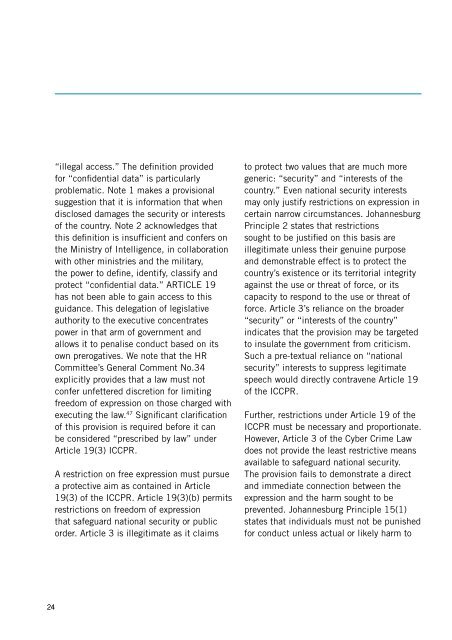Islamic Republic of Iran: Computer Crimes Law
Islamic Republic of Iran: Computer Crimes Law
Islamic Republic of Iran: Computer Crimes Law
You also want an ePaper? Increase the reach of your titles
YUMPU automatically turns print PDFs into web optimized ePapers that Google loves.
24<br />
“illegal access.” The definition provided<br />
for “confidential data” is particularly<br />
problematic. Note 1 makes a provisional<br />
suggestion that it is information that when<br />
disclosed damages the security or interests<br />
<strong>of</strong> the country. Note 2 acknowledges that<br />
this definition is insufficient and confers on<br />
the Ministry <strong>of</strong> Intelligence, in collaboration<br />
with other ministries and the military,<br />
the power to define, identify, classify and<br />
protect “confidential data.” ARTICLE 19<br />
has not been able to gain access to this<br />
guidance. This delegation <strong>of</strong> legislative<br />
authority to the executive concentrates<br />
power in that arm <strong>of</strong> government and<br />
allows it to penalise conduct based on its<br />
own prerogatives. We note that the HR<br />
Committee’s General Comment No.34<br />
explicitly provides that a law must not<br />
confer unfettered discretion for limiting<br />
freedom <strong>of</strong> expression on those charged with<br />
executing the law. 47 Significant clarification<br />
<strong>of</strong> this provision is required before it can<br />
be considered “prescribed by law” under<br />
Article 19(3) ICCPR.<br />
A restriction on free expression must pursue<br />
a protective aim as contained in Article<br />
19(3) <strong>of</strong> the ICCPR. Article 19(3)(b) permits<br />
restrictions on freedom <strong>of</strong> expression<br />
that safeguard national security or public<br />
order. Article 3 is illegitimate as it claims<br />
to protect two values that are much more<br />
generic: “security” and “interests <strong>of</strong> the<br />
country.” Even national security interests<br />
may only justify restrictions on expression in<br />
certain narrow circumstances. Johannesburg<br />
Principle 2 states that restrictions<br />
sought to be justified on this basis are<br />
illegitimate unless their genuine purpose<br />
and demonstrable effect is to protect the<br />
country’s existence or its territorial integrity<br />
against the use or threat <strong>of</strong> force, or its<br />
capacity to respond to the use or threat <strong>of</strong><br />
force. Article 3’s reliance on the broader<br />
“security” or “interests <strong>of</strong> the country”<br />
indicates that the provision may be targeted<br />
to insulate the government from criticism.<br />
Such a pre-textual reliance on “national<br />
security” interests to suppress legitimate<br />
speech would directly contravene Article 19<br />
<strong>of</strong> the ICCPR.<br />
Further, restrictions under Article 19 <strong>of</strong> the<br />
ICCPR must be necessary and proportionate.<br />
However, Article 3 <strong>of</strong> the Cyber Crime <strong>Law</strong><br />
does not provide the least restrictive means<br />
available to safeguard national security.<br />
The provision fails to demonstrate a direct<br />
and immediate connection between the<br />
expression and the harm sought to be<br />
prevented. Johannesburg Principle 15(1)<br />
states that individuals must not be punished<br />
for conduct unless actual or likely harm to


